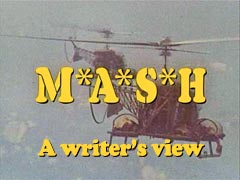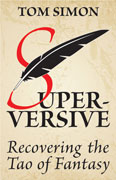M*A*S*H: A writer’s view. First in a series.
The Korean War is still not a hundred years in the past, though it is long enough now that the surviving veterans of that war are becoming rather thin on the ground. But even in 1972, when M*A*S*H went on the air, the series format for storytelling was much older than a hundred years. Before television, there was radio; before radio, there were the newspapers and magazines, and the ‘penny dreadfuls’ that kept every literate child supplied with lurid adventure. If you go back far enough, you can trace the roots of the form all the way to the Odyssey; which, come to think of it, would make a fine TV series in its own right.

Opening titles, ‘M*A*S*H: The Pilot’
The smash TV series, so to speak, of 1836 was The Pickwick Papers: Mr. Pickwick and his comic manservant, Sam Weller, were the talk of England for a year and a half, and soon after in every country where their serialized adventures were reprinted or translated. Their creator, Charles Dickens, went on to become the acknowledged giant of Victorian letters, and single-handedly created a kind of literary celebrity that has had none but pale imitations since; though some of Dickens’ inventions, like the author’s reading, plague us still.
Nowadays, after its century-long detour through the mass media, the serial story is having something of a revival in print. With the rise of ebooks, the length of publishable stories is no longer limited by the demands of commercial printing. It takes a certain length of story to fill enough pages to justify the cost of printing book covers, and above another certain length, the book becomes too thick for the binding to hold together without inordinate expense. The serial, in its revived form, can transgress both those limits. Individual episodes can be as short as short stories, yet be profitable to sell individually. A whole series can be as long as the ‘binge reader’ likes and the author can supply. There was no end to the old tales and ballads about Robin Hood; The Count of Monte Cristo, by Dickens’ great French counterpart, runs a tidy half-million words or so. Pickwick itself makes a long book, but it is a book of short episodes; not a picaresque, as it is sometimes called by blinkered literary critics, but an episodic series – in fact, a situation comedy.
There is no reason why situation comedy (or any other kind of story) should be restricted to one medium. Some of the best work in that field was done by P. G. Wodehouse, whose most famous creations, Jeeves and Bertie Wooster, appeared in print, in short story and novel form, over a span of nearly sixty years. Some stories, it is true, are suited for one particular medium. Visual spectacle, whether in the grand form of colossal special effects or the modest form of slapstick, requires a visual medium – film or television. Close introspection, the detailed examination of a character’s thoughts and emotions, lends itself better to written work: which has led some misguided souls to suppose that only the solemn psychological novel is worthy of being regarded as literature. But there is a wide range of stories that can be told in written or dramatic form, according to taste and budget. The story of character need not be the soul-searching or navel-gazing of a single protagonist; it can as easily arise from the interactions between several more or less fleshed-out characters. And that kind of story can often be told equally well in whatever medium one prefers.
M*A*S*H is just that kind of story; or rather, that kind of story cycle. [Read more…]









Recent Comments